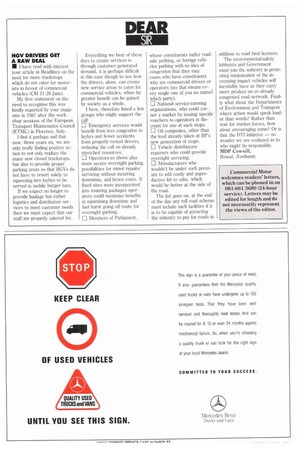DEAR
Page 60

If you've noticed an error in this article please click here to report it so we can fix it.
SIR
DIGV DRIVERS GET A RAW DEAL • I have read with interest your article in Headlines on the need for more truckstops which do not cater for motorists in favour of commercial vehicles (CM 21-28 June).
My first statement on the need to recognise this was kindly reported by your magazine in 1987 after the workshop sessions of the European Transport Maintenance Council (ETMC) in Florence, Italy.
I find it perhaps sad that now, three years on, we are only really finding positive action to not only replace the many now closed truckstops, but also to provide proper parking areas so that HGVs do not have to resort solely to squeezing into laybys to be served in mobile burger bars.
If we expect no longer to provide haulage but rather logistics and distribution services to meet customer needs then we must expect that our staff are properly catered for. Everything we hear of these days to create services is through customer-generated demand, it is perhaps difficult in this case though to see how the drivers, alone, can create new service areas to cater for commercial vehicles, when far greater benefit can be gained by society as a whole.
I have, therefore listed a few groups who might support the call:
0 Emergency services would benefit from less congestion in laybys and fewer accidents from properly rested drivers, reducing the call on already stretched resources.
0 Operators-as above plus more secure overnight parking, possibilities for minor repairs/ servicing without incurring downtime, and hence costs. If fixed sites were incorporated into routeing packages operators could maximise benefits in minimising downtime and fuel burnt going off route for overnight parking.
111 Members of Parliament,
whose constituents suffer roadside parking, or foreign vehicles parking with no idea of congestion that they may cause, who have constituents who are commercial drivers or operators (yes that means every single one of you no matter which party).
O National service/catering organisations, who could corner a market by issuing specific vouchers to operators at discount for use at such stops.
O Oil companies, other than the lead already taken at BP's new generation of stops. 0 Vehicle distributors/ repairers who could provide overnight servicing. O Manufacturers who wouldn't be under such pressure to add costly and unproductive kit to cabs, which would be better at the side of the road.
The list goes on, at the end of the day any toll road scheme must include such facilities if it is to be capable of attracting the industry to pay for roads in addition to road fund licences.
The environmental/safety lobbyists and Government must join the industry in promoting minimisation of the increasing impact vehicles will inevitably have as they carry more product on an already congested road network. Finally what about the Departments of Environment and Transport where action would speak louder than words? Rather than wait for market forces, how about encouraging some? Or is that the DTI initiative — no wonder we are coniused as to who might be responsible. MDP Cowsill, Bozeat, Northants.




































































































